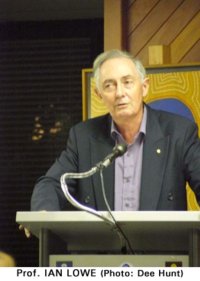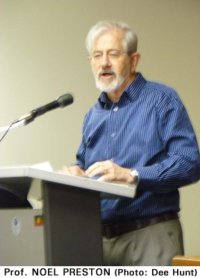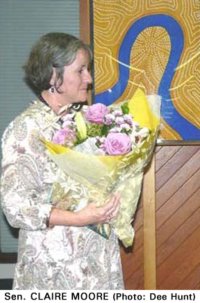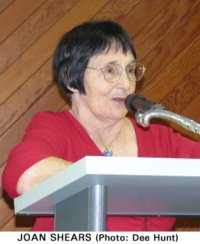Peace and social justice activists gathered in the Queensland Council of Unions building to celebrate the Order of Australia medal awarded to Joan Shears for her service in the promotion of peace, nuclear disarmament and social justice issues. One of the many personal testimonials submitted with the nomination named her “The Mother of Peace”.
The Union Choir and the Women’s International League for Peace and Freedom entertained the gathering with songs and humour specially prepared for the evening. There was delicious dinner and speeches of congratulations and stories and recollections of working alongside Joan in the peace movement. The following are some extracts from a few of the evening’s speakers.

“…Throughout all the debates, all the ups and downs, Joan has kept reminding us that the three problems of uranium mining and nuclear power will not go away, no matter how much obfuscation there is from the big end of town. First, that the mining of uranium and the production of nuclear power inevitably produces radioactive waste for which 50 years down the track there is still no proven solution and no coherent national strategy anywhere in the world. Secondly, it inevitably contributes to the risk of weapons proliferation. And while the problem of waste management is a technical problem that at least is capable of a technical solution, the problem of weapons proliferation is a social and political problem that appears totally insoluble and in that sense the export of uranium is inevitably making it more likely that nuclear weapons will be produced and used. And third, she’s reminded us constantly that there are enormous local environmental impacts of the mining of uranium upon areas like Roxby Downs and like Ranger. And if you doubt that, take a look at Mary Kathleen or Rum Jungle, the places where we’ve mined uranium in the past, to see the legacy left there for all future generations…[1]
“I have a little French postcard at home that says with wonderful Gallic humour, We’re going to change the world. Underneath in smaller writing it says, If it’s not you, my little one, who will begin to change the world? Who will do it? …We can’t wait for other people, we can’t wait for our elected leaders, we certainly can’t wait for big business. We have to be the change we want to see in the world. And throughout an enormous working lifetime here in Queensland, Joan has exemplified that principle, and shown us that one person can make a difference, one person can inspire hundreds of others to work for a clean future. It’s wonderful to be here tonight to pay tribute to Joan. Please join me in applauding her efforts.”

“The peace movement hasn’t always been that peaceful. It worked, but it worked with a lot of friction at times. But this lady, Joan Shears, across the factions of the peace movement, has been embraced by all. She’s been above all that. She’s been accepted by all players and that’s a great tribute, because she not only works for peace, she lives peace. And when I saw your name, Joan, on the Order of Australia Medal List, I was delighted that the grassroots were acknowledged, that you were acknowledged. You are a most worthy recipient, a reliable friend, a wonderful mother, a faithful activist, and a fearless campaigner.”

“…The thing that I most love about Joan is her welcome and engagement toward everyone. And when we are working around issues of peace and social justice there are divisions of different views, different politics, people have their own particular process. Joan makes sure we forget the differences and focus on what we share, and that is her absolute strength. Your networking Joan and the way you bring people together – you make us better... We know you’ve put all this work in up til now but we expect you to keep on doing it. We need you …no matter what you ask, we do, and we always say thank you so much. But now we want you to say something, because as we all know, for many years Joan did not make any speeches at all.

“…I’ve been able to stay with things over the years because I have a wonderful family who always come to the party when I need it and I’m happy in the things that I do because I think we’re headed in the right direction… So I’ve had the time and I’ve had the support and I’ve had the company and I have the knowledge that what we are trying to do is the right thing to do. The other reason why I’ve been able to stay at it is because we had George Georges who was always there and another was a bequest in a will that gave us some thousands of dollars which we decided not to spend all at once, but spread it about as widely as we could in the community, taking into account that if we’re talking about a peaceful world we need a peaceful community around us and there’s so many things happening in our own community that need addressing and if we can in any way help, we do. It’s not just me you see. I can make the phone calls, but if nobody comes, well you wouldn’t keep on doing it time after time. There’s always people who turn up and they obviously are intent upon getting to the same place that I’ve been trying to get to. So it is all of us, it’s not just me. And I am honoured to have my name on it. The Governor said to me yesterday that she was pleased and interested to see that these issues were being recognised with the award.
“So I think that we can all join in that, we can all share in that because it doesn’t happen for just one person and I have to say thank you to all these people here… what a joy to see you all and to feel the comradeship and happiness here tonight. And that takes all of us, it doesn’t come from just one direction, it comes from everybody. Thank you all for coming. I will look back at this with real joy and pride for a long time, and I will try to keep going. I’ve just got myself a little bit more ticker, so I should be able to get back into the stream of things. I have been slacking off lately you know. Seeing all the different organisations that are represented here and we’re all working toward the same end, that’s the best thing we can do - keep ourselves together so that we can draw more and more people into the cause.”
 Home | Aims and Objectives of Solidarity Philippines Australia Network | About Kasama
Home | Aims and Objectives of Solidarity Philippines Australia Network | About Kasama 
Search the SPAN Web